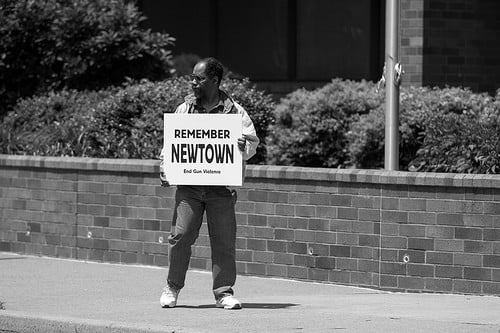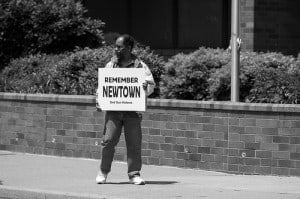It seems like our nation only pays serious attention to the problem of gun violence in the aftermath of a mass shooting, such as happened on Monday at the Washington Navy Yard.
Once again the nation is focused on a single tragic loss of life, wholly unnecessary and completely shocking. But we also know that this is not a single tragedy; shooting rampages and mass killings happen with terrible frequency in the U.S. Once again we enter into a national debate over how to respond to this kind of massacre and how to stop it from happening again.
When schoolchildren were murdered in Newtown and others asked if it was too soon to respond, I asked if, in the wake of 31 mass killings since 1999, we had already waited too long. And today, given that there have been over 8,000 reported gun deaths since that terrible morning in Connecticut, I am convinced that now is the time we must look back over the months since Newtown — when we seemed to be at a tipping point in the national debate of gun rights and gun regulations and our care for the mentally ill, when we finally seemed ready to take concrete action to stem the violence — and ask the question: what have we done to counter the culture of gun-killings in American society? And what have we avoided doing?
In the nine months since twenty children and six adults were shot and killed at Sandy Hook Elementary School, at least 17 states have actually made it easier to carry a gun and ammunition, while far fewer have tightened regulations. Some states have gone so far as to threaten legal penalties for federal agents who enforce federal gun laws within those states, while some municipalities have tried to require residents to carry guns. In one state, two senators who supported stricter gun control regulation were successfully recalled. All of this seemed to be in direct opposition to the gathering momentum and national consensus for tighter gun regulation. Instead of having a real debate about how to end gun violence in America, we devolved into a bizarre morality play about whether or not the government was coming for our guns.
Now the latest news to emerge from the ongoing coverage of the mass murder at the Washington Navy Yard is that the alleged gunman may have been dealing with mental illness for more than a decade, following a well-trod pattern from previous mass killings, which I looked at in another article soon after Newtown. In the last six months mental health legislation has stalled at the federal level, and the only other federal legislation addressing mental health care is tied up in the Affordable Care Act, which itself has been subject to ongoing debate and challenge. Some progress has been made at the state level, but even that has run into complicated concerns about privacy and stigma of the mentally ill.
***
In 1984, Pope John Paul II described how social sin is perpetuated through individual responsibility, or the lack thereof:
It is a case of the very personal sins of those who cause or support evil or who exploit it; of those who are in a position to avoid, eliminate or at least limit certain social evils but who fail to do so out of laziness, fear or the conspiracy of silence, through secret complicity or indifference; of those who take refuge in the supposed impossibility of changing the world and also of those who sidestep the effort and sacrifice required, producing specious reasons of higher order.
At some point — a point I think we have long since passed — we need to have the guts to ask ourselves: when evil is being perpetrated, and we do nothing to change it, are we not being complicit in that very evil? Why are we doing nothing, why are we satisfied with complicity, why do we refuse to accept responsibility and create a better, more just society?
When it comes to the sins of society, we all have a personal responsibility, by virtue of human solidarity, to make positive changes for the protection and well-being of our communities and all the individuals within them. We have that responsibility now, nine months after Newtown, and two days after the Navy Yard. There’s nothing else we need to wait for before recognizing the need to act against the evil of gun violence, and there hasn’t been for a long time.



